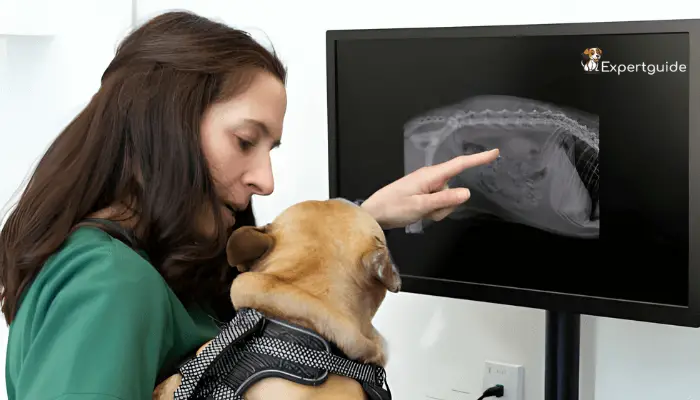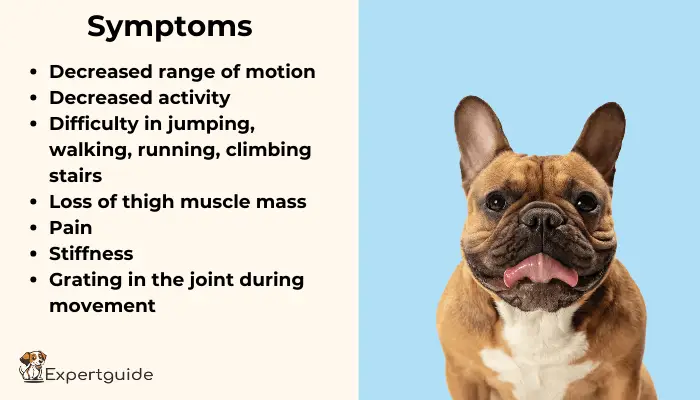Hip Dysplasia is a common genetic disease affecting large dogs but can also affect Frenchie. It depends upon the genetic disease of the dogs according to the body structure.
According to scientific terms, Hip Dysplasia is a complex development disease of the coxofermoral joint. These abnormalities lead to inflammatory reactions with secondary degenerative joint disease associated with pain from mild to severe.
Hip Dysplasia is a common orthopedic condition and you can detect the walking difference with hip laxity in your French bulldogs. You can also observe the dog’s sitting behavior such as sitting like a frog. This Detailed article will provide all the information about Hip Dysplasia in French bulldogs with Symptoms, treatment, and Causes.
What is Hip Dysplasia?

According to the National Institute of Health, Hip Dysplasia is a complex development disease of the coxofermoral joint and it is a common orthopedic condition where the ball and socket joint of the hip is not correctly formed. French bulldogs have a high risk of hip dysplasia due to the structure of the body.
If your Frenchie shows the symptoms of hip Dysplasia then consult a veterinarian for proper treatment and it was important to cure hip dysplasia. It can cause extreme pain and hard for French bulldogs to walk. Untreated hip dysplasia can result in pain and the development of hip arthritis.
You can reduce the chance of hip dysplasia in Frenchie by maintaining weight, avoiding jumping off high objects, and over-exercising. The signs of hip dysplasia can be observed after 5 months old.
What are the Symptoms of hip dysplasia?

These are the symptoms of hip Dysplasia in French bulldogs.
- Decreased range of motion
- Decreased activity
- Difficulty in jumping, walking, running, climbing stairs
- Loss of thigh muscle mass
- Pain
- Stiffness
- Grating in the joint during movement
The symptoms can vary according to the severity of the disease and the level of inflammation.
What are the Causes of hip dysplasia?
There are several causes for hip dysplasia and it is mainly found in dog breeds like large dogs such as Great Dane, Saint Bernard, German Shepherd, etc. But Frenchie also has hip dysplasia due to the type of breed. Below are the causes of hip dysplasia.
- Excessive growth rate
- Improper weight
- Unbalanced nutrition
- Exercises types
- Genetic Predisposition
Certain breeds need special nutrition requirements and food to prevent them from excessive growth which reduces the chance of hip dysplasia. Improper nutrition can also influence the hip dysplasia.
What are the treatments for hip dysplasia?
If your Frenchie has hip dysplasia then consult a veterinarian for proper solutions. The treatment can vary and the vet may suggest different solutions according to their check-up.
- Physical therapy
- Joint supplements
- Exercise restriction
- Anti-inflammatory medication
- Exercise reduction
- Weight reduction
If your dog was recommended for surgery then below are the treatments for hip dysplasia
- Total hip replacement
- Femoral head ostectomy
- Double or triple pelvic osteotomy
For more information, you can check the detailed guide on the treatment of hip dysplasia.
What is the Prevention of hip dysplasia?

To prevent frenchie from hip dysplasia, you need to reduce over-exercising and avoid jumping from the high surface area. We can not prevent hip dysplasia in all cases but you can observe and prevent the Frenchie.
Reducing the weight of dogs and providing nutritious food with a healthy diet will prevent dogs from hip dysplasia. If your dog shows symptoms of hip dysplasia then consult a veterinarian as soon as possible and untreated hip dysplasia will lead to many other problems. So reduce fatty food and unnecessary exercise and training.
What age do Frenchies get hip dysplasia?
The dogs after 5 months can show the symptoms of hip dysplasia. It depends upon the structure and dog breeds. It occurs when they become older and untreated hip dysplasia will lead to major hip problems.
How long can a dog live with hip dysplasia?
Hip Dysplasia will not shorten the lifespan of French bulldogs. But dogs have extreme pain and difficulty in walking. If the dogs eat too much food and become fatty structure then hip dysplasia chance is higher.
Can a dog fully recover from hip dysplasia?
Hip Dysplasia will not be fully recovered but the treatment proved pain relief and further injuries from hip sides. If you find the symptoms of hip dysplasia in dogs at an early age then treatment could be better without any surgery.
Can hip dysplasia heal on its own?
It depends upon the type of hip dysplasia and injuries. If the injuries are small then they might resolve on their own, but untreated hip dysplasia will cause major hip problems and extreme pain.
Is hip dysplasia painful in dogs?
Hip Dysplasia is extremely painful and French bulldogs have difficulty walking and running. It can impact the significant quality of dogs’ lives.

